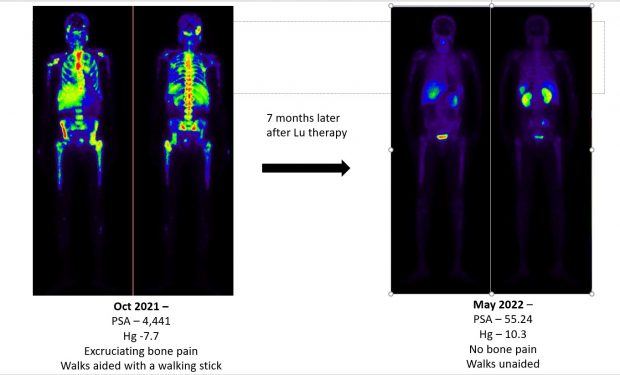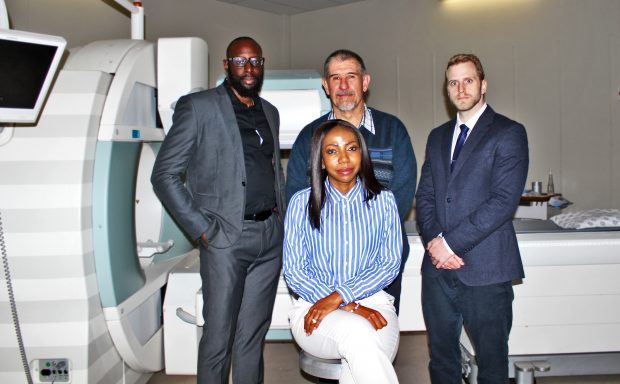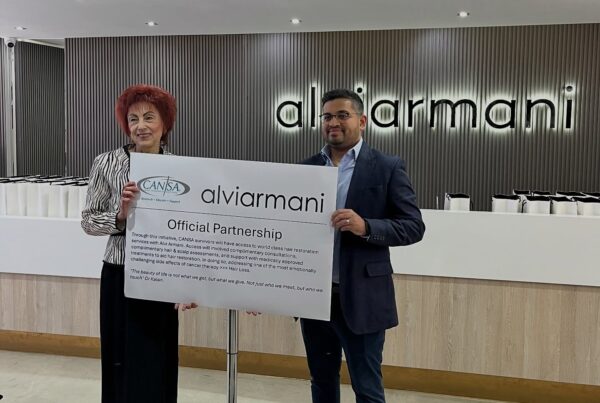The University of the Free State (UFS) Department of Nuclear Medicine has announced the successful treatment outcome of a patient with metastatic castrate-resistant prostate cancer (MCRPC). This is an advanced stage of prostate cancer. The department used Lutetium 177 PSMA (Lu-177 PSMA) therapy. The case was with an advanced-stage prostate cancer, which had failed first-line chemotherapy, leaving little or no other treatment options.
Successfully treating advanced-stage prostate cancer
UFS started this treatment just over a year ago. The university and the Free State province are now joining other South African medical universities, such as the University of Pretoria, and other provinces in using this method to treat MCRPC patients. Lutetium 177 PSMA (Lu-177 PSMA) therapy is used on MCRPC patients who are not eligible for chemotherapy or have failed first- or second-line chemotherapy.

With the permission of the patient, the images above show the dramatic treatment response following Lu-177 PSMA therapy. The images on the left show widespread bone disease from the prostate cancer, including the skull. The images on the right show the dramatic response after completing four cycles of Lu 177 PSMA, with the normal excretion of the radiotracer seen in the liver, kidneys, and bladder.
Dr Gerrit Engelbrecht, Clinical Head of the Department of Nuclear Medicine at the UFS, says the department is proud to be able to offer this treatment option to some of these patients.
“It is a big win for the Free State and our oncology patients to be able to offer these expert services.”
The UFS and Universitas Academic Hospital have now been able to join up with other academic institutions and hospitals in other provinces to offer these services. So far, three patients have been offered this therapeutic option, with a third patient currently undergoing treatment.
Funds and equipment for proper treatment selection are needed
The expertise is no longer an issue for the UFS thanks to Dr Osayande Evbuomwan, a nuclear medicine specialist and consultant. He was trained and exposed to this therapy at the University of the Witwatersrand during his training as a nuclear medicine resident. Current registrars in the Department of Nuclear Medicine at the UFS are also being trained in the application of this treatment modality.

The team of doctors in the Department of Nuclear Medicine behind the success story are, from the left (standing): Dr Osayande Evbuomwan, nuclear medicine specialist and Senior Lecturer; Dr Gerrit Engelbrecht, Clinical Head of the Department of Nuclear Medicine at the UFS; and Dr Walter Endres, nuclear medicine registrar. In front is Dr Tebatso Tebeila, nuclear medicine registrar.
However, proper patient selection is key in the management of these cases with Lu 177 PSMA. Without a PET/CT camera, it is challenging to appropriately select the patients who are most likely to respond to this therapy. This is an example of how PET/CT is crucial in the management and monitoring of oncology patients.
Both Drs Engelbrecht and Evbuomwan hope that the training of more registrars will increase their department’s capacity to treat more patients. They also hope that funds will be made available to acquire a much-needed PET/CT camera, which will greatly assist them in identifying the correct patients in need of this treatment.
Treatment puts the department, UFS, and hospital on the map
According to Dr Evbuomwan, the ability to administer this treatment puts the department, the UFS, and the hospital on the map, alongside other top universities within and outside the country.
Says he: “It also creates an avenue for us to gather data for training, research purposes, and publications. We are now able to offer a promising, safe, and highly efficacious therapy for patients with MCRPC in the Free State. Some of these patients will no longer have to travel to other provinces to receive this treatment.”
“We are also well aware that not every patient will respond this way; however, proper patient selection is key in identifying responders – an area that is still being researched. We also do not know how long these patients will have their disease under control after the treatment. Nuclear medicine’s greatest cancer therapy success story is the treatment of well-differentiated thyroid cancer with radioactive iodine.”
“After treatment, most of these patients remain cancer-free for a very long period of time, if not for life. With continuing research in the field of MCRPC radioligand therapy, we aim to improve the treatment modality, hopefully getting it to the success level of thyroid cancer therapy.”



![women [longevity live]](https://longevitylive.com/wp-content/uploads/2020/01/photo-of-women-walking-down-the-street-1116984-100x100.jpg)










